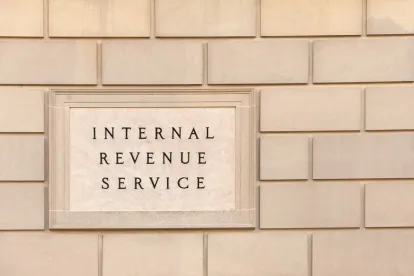After several months of halting negotiations, Congress passed the Consolidated Appropriations Act, 2021 (the Act) late in the evening on December 21, 2020. The Act includes omnibus appropriations language to fund the government through September 30, 2021, COVID-19 relief, and a variety of other legislative priorities. This alert provides a high-level summary of the Act’s many tax provisions affecting corporations, organizations, and individuals.
Although the White House indicated that President Trump would sign the bill at the time of Congressional approval, he since has indicated concerns with several of the provisions in the legislation and has asked Congress to make changes. It is unlikely that Congress will be willing or able to revise the package and unclear whether the President will decide to veto the bill as a result. Although the legislation was passed by wide, bipartisan margins in both chambers and Congress potentially could override a Trump veto, it is unclear given the political climate, including the pending Georgia special elections, whether they would do so.
COVID-19 RELIEF
The Act includes several policies aimed at providing relief to businesses, organizations, and individuals to help them weather the COVID-19 pandemic and keep employees on payroll.
-
Individual recovery rebates of $600 per individual, including children
-
Extension of time to one year for individuals to repay deferred employment taxes
-
Personal Protective Equipment (PPE) costs made eligible for educator expense deduction
-
Expenses paid with forgiven Paycheck Protection Program (PPP) loan proceeds are deductible
-
Clarification that forgiveness of certain financial aid under the CARES Act is not taxable income and information reporting requirements for forgiveness of indebtedness are waived
-
Penalty-free withdrawals from certain retirement plans for COVID-19 related expenses and special rules for repayment
-
Special rules for farmers and carryback of net operating losses
-
SSI and SSDI payments are excluded from the IRS private debt collection program
-
Election allowed to terminate transfer period for qualified transfers from a pension plan to cover future retiree costs
-
Extension through March 31, 2021 of tax credits for paid sick and family leave originally enacted in the Families First Coronavirus Response Act and modifications to the computation of the credits
RECOVERY AND OTHER STIMULUS PROVISIONS
The Act includes a series of miscellaneous provisions intended to provide additional relief and stimulus to recover from the economic impact of the COVID pandemic.
-
Establish a permanent four percent minimum low-income housing tax credit rate
-
Depreciable recovery period of 30 years for certain residential rental property placed in service before January 1, 2018
-
Waste energy recovery property made eligible for the energy investment tax credit (ITC)
-
Extension of ITC for offshore wind facilities that begin construction through 2025
-
Update to minimum rate of interest for certain determinations related to life insurance contracts
-
Revisions to the CARES Act employee retention credit increasing the amount of the credit and making it easier for employers to qualify
-
Update minimum age to 55 for distributions from certain tax-exempt multiemployer pension plans during working retirement for individuals in the building and construction industry
-
Modify the temporary rule preventing partial pension plan terminations
-
100 percent deduction for business meals paid or incurred in 2021 and 2022
-
Allow use of 2019 income to determine Earned Income Tax Credit (EITC) and Additional Child Tax Credit (ACTC) for 2020
-
Extend and increase the non-itemizer charitable contributions deduction for 2021 to $300 for single filers and $600 for married filing jointly
-
Extend the CARES Act increased limit for charitable contributions for one year for corporations and taxpayers that itemize
-
Greater flexibility for flexible spending arrangements
DISASTER TAX RELIEF
The Act includes several policies to provide relief for individuals and businesses in presidentially declared disaster areas for major disasters declared on or after January 1, 2020 through 60 days after enactment. These policies do not apply to disaster areas declared solely because of COVID-19.
-
Special disaster-related rules providing exceptions related to the use of retirement funds
-
An employee retention credit for employers affected by qualified disasters
-
Temporary suspension of charitable contribution limitations
-
Special rules for qualified disaster-related personal casualty losses
-
Increase in the low-income housing tax credit state ceilings for 2021 and 2022
-
Allow the Secretary of the Treasury to provide payments to U.S. territories for losses incurred due to disasters
EXTENDERS
The Act addressed dozens of temporary tax provisions. Rather than the usual practice of extending all of them for the same period of time, Congress took a different approach by making a number of them permanent, extending others through 2025 – which will align their expiration with the expiration of key provisions from the Tax Cuts and Jobs Act, and extending other provisions for various lesser periods of time.
-
Tax Extenders Provisions Made Permanent:
-
Reduction in medical expense deduction floor
-
Energy efficient commercial buildings deduction (IRC Section 179D)
-
Benefits provided to volunteer firefighters and emergency medical responders
-
Repeal the qualified tuition deduction and expand the lifetime learning credit
-
Railroad track maintenance credit
-
Reduction in certain excise taxes on beer, wine and distilled spirits (craft brewers)
-
Beginning in 2023, refunds provided in lieu of reduced rates for certain imported craft beverages
-
Clarify that reduced rates are not allowed for smuggled or illegally produced beer, wine, and spirits
-
Modify the minimum processing requirements for reduced distilled spirits rates
-
Modify single taxpayer rules regarding beer, wine and distilled spirits
-
-
Tax Extenders Provisions Extended Through 2025
-
Look-thru rule for payments of dividends, interest, rents, and royalties between related controlled foreign corporations
-
New markets tax credit
-
Work opportunity tax credit
-
Exclusion from gross income of discharge of qualified principal residence indebtedness; maximum exclusion reduced from $2 million to $750,000
-
Seven-year recovery period for motorsports entertainment complexes
-
Expensing rules for certain film, television, and theatrical productions
-
Oil spill liability trust fund excise tax rate of $0.09 per barrel
-
Empowerment zone tax incentives, with modifications to terminate deferral of certain capital gains taxes and increased expensing of certain types of equipment
-
Employer credit for paid family and medical leave
-
Exclusion for certain employer payments of student loans up to $5,250
-
Extension of carbon oxide sequestration credit for facilities that begin construction by the end of 2025 (IRC Section 45Q)
-
-
Extension of Certain Other Provisions (various extension periods, as noted)
-
Production Tax Credit (PTC) extended for renewable power facilities beginning construction by the end of 2021. Note that for wind facilities where construction begins by the end of 2021, the credit remains reduced by 40 percent.
-
Investment Tax Credit (ITC) extended at 26 percent for solar energy property, fiber-optic solar equipment, fuel cell property, and small wind energy property beginning construction by the end of 2022; 22 percent rate for property beginning construction by the end of 2023; 10 or zero percent thereafter. Ten percent investment credit for microturbine property, geothermal heat pumps, and combined heat and power property that begin construction through 2023.
-
Mortgage insurance premiums treated as qualified residence interest extended through 2021
-
Health coverage tax credit extended through 2021
-
Indian employment credit extended through 2021
-
Mine rescue team training credit extended through 2021
-
Classification of certain race horses as three-year property extended through 2021
-
Accelerated depreciation for business property on Indian reservations extended through 2021
-
American Samoa economic development credit extended through 2021
-
Second generation biofuel producer credit extended through 2021
-
Nonbusiness energy property credit extended through 2021
-
New qualified fuel cell motor vehicle credit extended through 2021
-
Alternative fuel refueling property credit extended through 2021
-
Two-wheeled plug-in electric vehicle credit extended through 2021
-
Production credit for Indian coal facilities extended through 2021
-
New energy efficient homes credit extended through 2021
-
Excise tax for alternative fuels extended through 2021
-
Residential energy efficient property credit extended through 2021; eligible property expanded to include qualified energy efficient biomass fuel property with a thermal efficiency rating of at least 75 percent beginning in 2021 (no longer eligible under IRC Section 25C)
-
Black lung disability trust fund excise tax extended through 2021
-
OMISSIONS
While the Act covers a smorgasbord of issues, several important policies that were under consideration were not included in the final bill for various reasons, including political differences and concerns about cost.
-
COVID-19 relief funding for state, local and tribal governments
-
COVID-19 liability protection
-
Mobile workforce clarifications for workers temporarily working in a tax jurisdiction other than their normal place of business
-
Conservation easement legislation
-
Forgiveness of deferred employee payroll taxes pursuant to President Trump’s executive memorandum from August 8, 2020 (instead, repayment period extended to one year)
-
Multiemployer pension plan relief or
-
A stand-alone credit for PPE expenditures
LOOKING AHEAD
With the incoming Biden Administration and 117th Congress, many tax issues may be in play. President-elect Joe Biden and Congress have suggested they would like to begin work on the next iteration of COVID-19 relief as soon as January. While funding for state, local, and tribal governments and liability protection are expected to be key issues in the next relief package, tax policies almost certainly will be part of the mix. Infrastructure and green energy are other agenda items that will likely have a tax component. Regardless of the outcome of the Georgia special Senate elections on January 5, 2021, with close margins in both chambers, bipartisan cooperation generally will be necessary in order to garner enough support to pass legislation in the 117th Congress.







 />i
/>i

